

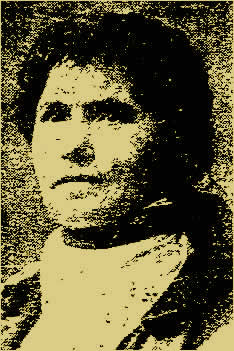
Phoebe was born sometime around 1850 (the date was never certain) to the aforementioned Christian Wise, regional surveyor and tireless promoter of local schools, and his wife Julie. She was the youngest of eight children. Even as a young girl she excelled academically, and by the age of fourteen was teaching music and English (including Paradise Lost) at the nearby Northview schoolhouse. Throughout her life she was known for playing beautiful, melancholy piano pieces late into the night--a sound which could be heard by passersby on the isolated Olivesburg Road. She was also known as an intellectual, someone capable of deep, intelligent conversation. In her later years she had these conversations with a curly-haired black dog.
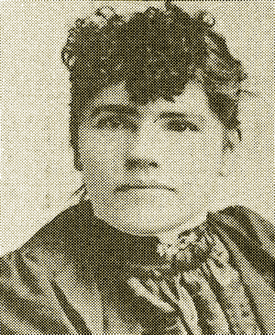
The house itself fell into unrelieved disrepair. Aside from the jungle-like yards and riotous lilacs, giant trees and thick vines crept into the cracks and crevasses of the kitchen side and began to pull it down bit by bit. Meanwhile, Phoebe herself was cracking up in subtler ways. She had always been a striking figure, jet-black hair combined with dark eyes which hinted at Indian blood. Around the homestead she was known for dressing like a hermit, in filthy man's clothes such as pants or overalls. For her weekly streetcar trips into town, however, she dressed up--and this was what made her memorable to most Mansfield citizens, who watched her shop each week in the gaudy costume she considered her "going out" clothes. They included a long, ruffled yellow dress with a train, an enormous wide-brimmed hat, and jewelry decorated with worthless gems. In this costume she made a lasting impression on the young Louis Bromfield, who recalled seeing her "witchlike" figure in front of Ashbrook's drugstore as one of the last things he saw the day he left for the war in Europe.
It was December 23, 1891, when the stories of the hidden family treasure which had been circulating in jailhouses and taverns around Richland County finally hit home with Phoebe Wise. The Mansfield Weekly News reported the details on Christmas Eve: Miss Wise heard noises in her sitting room and went to see who was there, only to face three men wearing bandannas over their faces. One grabbed her by the throat. All three had revolvers, and they explained that they had been planning to rob her for four or five years. They demanded to know where the treasure was hidden.
Phoebe asked to be allowed to show them, intending to retrieve her own gun and kill the intruders, but instead they bound her and began to torture her by burning the soles of her feet with a torch, demanding she tell them where the money was hidden. She gave up a diamond ring, a gold watch and chain, and the small amount of cash she had on her at the time (total value no more than $500), but wasn't able to turn over any hidden fortune because there wasn't one. Her house was ransacked mercilessly; floorboards were pried up and walls were hacked through with a metal prybar. Then the robbers ate a pie in her kitchen, argued over the division of their small booty, and threatened to kill Phoebe if she left the house after they'd gone.
Once Phoebe had freed herself she staggered down to the Reformatory and telegraphed the police depot, where the search began in earnest for the three sadistic burglars.
The two first caught turned out to be Thomas Bloor, 20, and William "Zip" Tyler, 23. Bloor confessed in jail, exonerating several suspects who had unknowingly come into possession of the stolen money through transactions at a local bar, and implicated not only Tyler, but the third bandit, Henry Zwefel. Zwefel was a more experienced outlaw, having previously served three years in the State Penitentiary for burglary in Richland County. During a trip to Ashland County to be indicted for complicity in another burglary he managed to escape, with other prisoners, from the jail at Loudonville, but- when he returned to Mansfield and declared himself a changed man, fully reformed and ready for the straight and narrow, the indictment was--incredibly--dropped, and he was allowed to go free. Next he was tried in Stark County on manslaughter charges related to a Massillon murder but was acquitted. Zwefel was a bit of a shady character all around.
Immediately after the Phoebe Wise robbery, Henry Zwefel skipped town. He was apprehended in January in Port Huron, Michigan, working in a cigar factory under an assumed name.
Amazingly, both Thomas Bloor and "Zip" Tyler escaped from custody in 1892. Bloor fled from a courthouse holding facility but was quickly run down and brought back to face charges, while Tyler got away clean, after using a wire to unhook his cell door latch on April 29.
The sensation caused by this gruesome burglary and torture brought a lot of unwanted attention to Phoebe Wise, who was now inundated with unsolicited advice, sympathy, and even professions of love. The most persistent of her new suitors was a 27-year-old immigrant from Austria-Hungary named Jacob Kastanowitz. He lived with his parents in Fairview, a tiny village on the northern outskirts of town which most in Mansfield called Pollocktown.
Jacob taught himself to speak five languages, but he also cut himself obsessively and began to stalk Phoebe with such determination that she thought she might go out of her mind herself. He would tap on her window at night, knock on her door, watch her as she walked around her house, follow her into town. He claimed to be entranced by her piano playing and her strong, independent beauty--but he also broke into her home on several occasions and assaulted her, going in and out of jail while he stalked her. Phoebe filed numerous harassment claims against him, and even succeeded in having him committed for a short time to the insane asylum in Toledo.
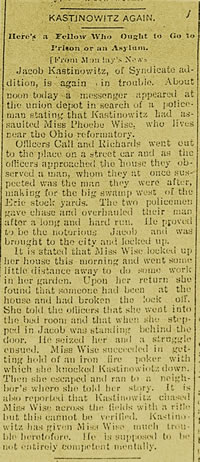
Then it came to a head, late on the night of May 22, 1898. Jacob Kastanowitz was staring at Phoebe through her windows, standing on a platform he'd constructed out of wood and stones, threatening to "take her away down South" where they could "be happy together." "Marry me or kill me," Jacob is supposed to have said. So Phoebe did just that, when he went for the door and tried to enter her house. One bullet from her Winchester .32 rifle went into his shoulder and hooked down through his right lung; the body fell beside the house.
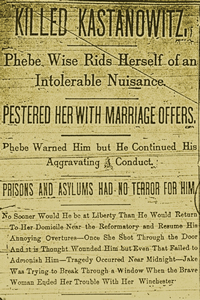
After her brushes with death, torture, robbery, and mental illness, Phoebe wanted a peaceful life. She became more reclusive than ever, but her home had become a landmark of the area north of Mansfield--the Heights just above the place where the Ohio State Reformatory still stands--and she appeared often in the newspapers, even for trivial things. In 1918, during a particularly cold winter, Phoebe was so seldom seen that it was assumed she'd frozen to death somewhere, but she turned up again. A year later a police officer discovered twelve sticks of dynamite in a rotted wicker basket across the Olivesburg Road from the Wise house. No one ever figured out what they were doing there or who had left them, but it was an ominous sign to Phoebe, who still felt she had defend her rotted home from intruders bent on finding her apocryphal fortune.
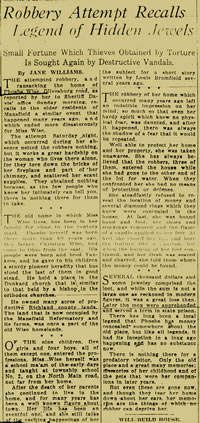
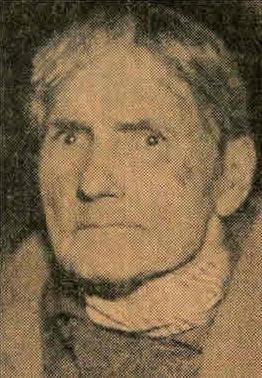
And today Phoebe's ghost can sometimes be seen walking down Reformatory Road in front of the prison, headed toward Route 545, dressed in her traditional colorful and eccentric town clothes, a long and arduous life behind her at last.
The Ohio State Reformatory Hauntings
Malabar Farm Hauntings
Bandits, Stalkers, & Murder: Life of the Tetched Phoebe Wise by Brett J. Mitchell
Mark Sebastian Jordan.com: Author of Phoebe, a play based on the story
"Kastinowitz Again." Mansfield Weekly News. July 14, 1896.
"Killed Kastinowitz." Mansfield Daily Shield. May 23, 1898.
Mitchell, Brett J. Bandits, Stalkers, & Murder: The Life of the Tetched Phoebe Wise. Mansfield, OH: Instantpublisher, 2005.
"Reports of Her Death Were Exaggerated." The Mansfield News. January 14, 1918.
Stanfield, Virgil A. "The Colorful Personalities in City's History: The Mansfield That Was." Mansfield News Journal. April 29, 1973.
"Vandals Ransack Home of Phoebe Wise in Search of Treasured Trinkets." Mansfield News Journal. March 21, 1933.
Williams, Jane. "Death Claims Phoebe Wise." The Mansfield News. March 13, 1933.
"Zwefel's Return." Mansfield Weekly News. January 14, 1892.